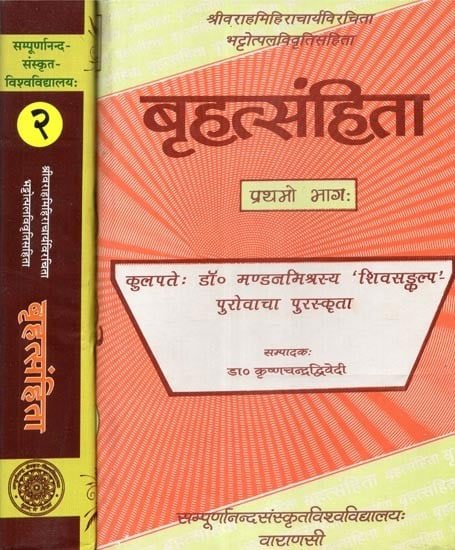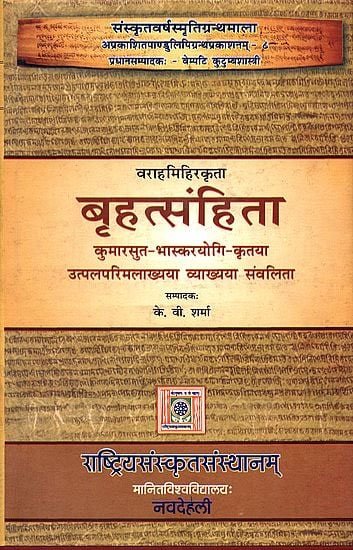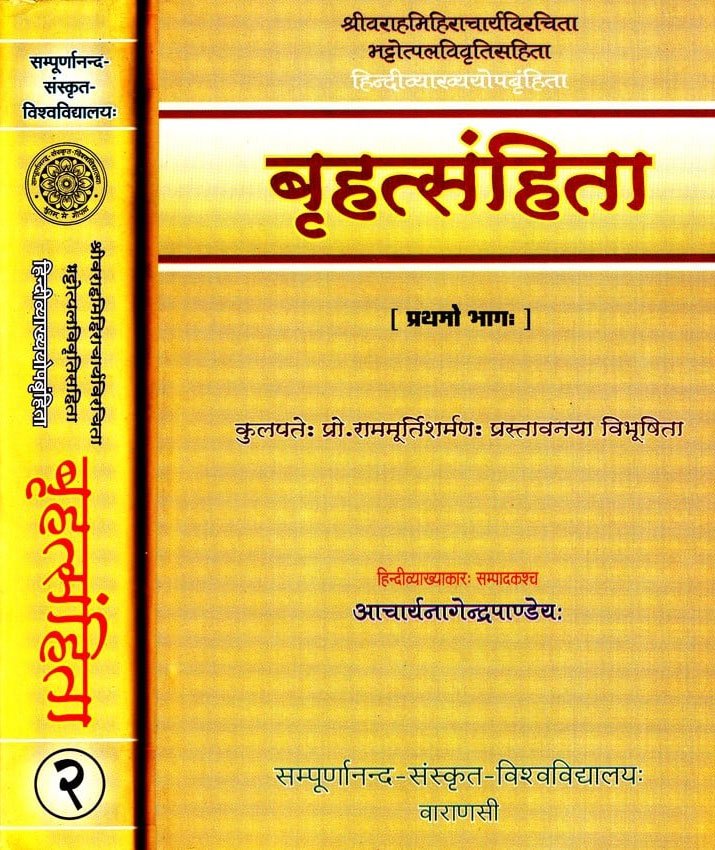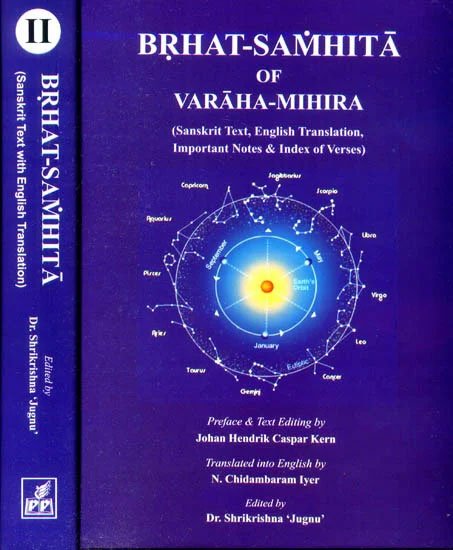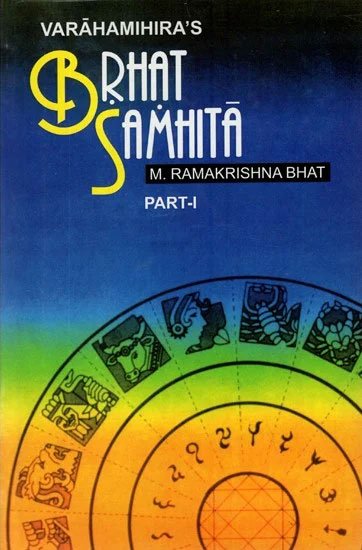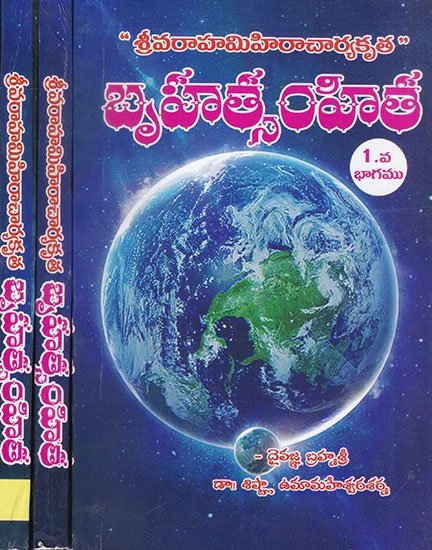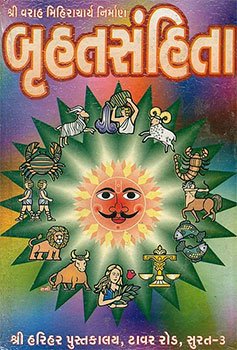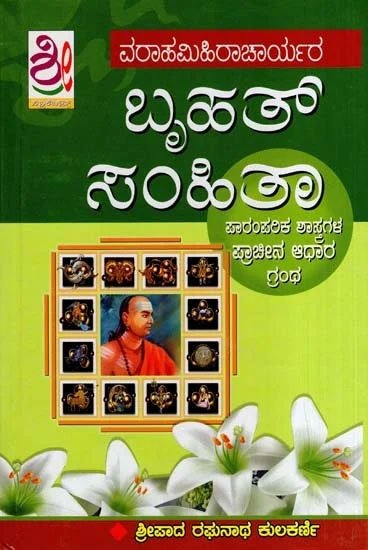Brihat-samhita [sanskrit]
26,560 words
The Sanskrit text of the Brihat-samhita from the 6th-century authored by Varaha Mihira in present-day Ujjain, India. It primarily deals with astrology and astronomy but is presented as an encyclopedia of knowledge.
Verse 103.16
कलत्रकलहाक्षिरुग्जठररोगकृत्सप्तमे क्षरत्क्षतजरूक्षितः क्षपितवित्तमानोऽष्टमे ।
कुजे नवमसंस्थिते परिभवार्थनाशादिभिर्विलम्बितगतिर्भवत्यबलदेहधातुक्लमैः ॥ १६ ॥
[क्षयित]
kalatrakalahākṣirugjaṭhararogakṛtsaptame kṣaratkṣatajarūkṣitaḥ kṣapitavittamāno'ṣṭame |
kuje navamasaṃsthite paribhavārthanāśādibhirvilambitagatirbhavatyabaladehadhātuklamaiḥ || 16 ||
[kṣayita]
The Sanskrit text of Verse 103.16 is contained in the book Brihata Samhita (Sanskrit Text with Hindi Translation) by Pandit Achyutananda Jha. This book is available online or you could buy the latest edition:
Read online Buy now! The Sanskrit text by Pandit Achyutananda Jha (2001)
Glossary of Sanskrit terms
Note: This extracts Sanskrit terms and links to English definitions from the glossary, based on an experimental segmentation of verse (103.16). Some terms could be superfluous while some might not be mentioned. Click on the word to show English definitions.
Kalatraka, Han, Akshi, Uksh, Jathararoga, Krit, Saptama, Ksharat, Kshataja, Rukshita, Kshapita, Vitta, Ana, Anu, Ashtama, Kuja, Navama, Samsthita, Samsthiti, Paribhava, Arthanasha, Vilambitagati, Bhavati, Bhavat, Bhavant, Eha, Dhatu, Klama,
Analysis of Sanskrit grammar
Note: this is an experimental feature and only shows the first possible analysis of the Sanskrit text (Verse 103.16). If the system was successful in segmenting the sentence, you will see of which words it is made up of, generally consisting of Nouns, Pronouns, Verbs, Participles and Indeclinables. Click on the link to show all possible derivations of the word.
- Line 1: “kalatrakalahākṣirugjaṭhararogakṛtsaptame kṣaratkṣatajarūkṣitaḥ kṣapitavittamāno'ṣṭame ”
- kalatraka -
-
kalatraka (noun, masculine)[compound], [vocative single]kalatraka (noun, neuter)[compound], [vocative single]
- la -
-
la (noun, masculine)[compound], [vocative single]
- hā -
-
ha (noun, masculine)[compound], [vocative single]ha (noun, neuter)[compound], [vocative single]han (noun, neuter)[compound], [adverb], [nominative single], [vocative single], [accusative single]hā (noun, feminine)[nominative single]han (noun, masculine)[nominative single]√hā (verb class 1)[imperative active second single]
- ākṣir -
-
ākṣi (noun, masculine)[nominative single]ākṣi (noun, feminine)[nominative single]
- ug -
-
ukṣ (noun, masculine)[compound], [adverb], [nominative single], [vocative single]ukṣ (noun, neuter)[compound], [adverb], [nominative single], [vocative single], [accusative single]
- jaṭhararoga -
-
jaṭhararoga (noun, masculine)[compound], [vocative single]
- kṛt -
-
kṛt (noun, masculine)[compound], [adverb], [nominative single], [vocative single]kṛt (noun, neuter)[compound], [adverb], [nominative single], [vocative single], [accusative single]
- saptame -
-
saptama (noun, masculine)[locative single]saptama (noun, neuter)[nominative dual], [vocative dual], [accusative dual], [locative single]
- kṣarat -
-
√kṣar -> kṣarat (participle, neuter)[nominative single from √kṣar class 1 verb], [vocative single from √kṣar class 1 verb], [accusative single from √kṣar class 1 verb], [nominative single from √kṣar class 2 verb], [vocative single from √kṣar class 2 verb], [accusative single from √kṣar class 2 verb]
- kṣataja -
-
kṣataja (noun, masculine)[compound], [vocative single]kṣataja (noun, neuter)[compound], [vocative single]
- rūkṣitaḥ -
-
rūkṣita (noun, masculine)[nominative single]√rūkṣ -> rūkṣita (participle, masculine)[nominative single from √rūkṣ class 10 verb]
- kṣapita -
-
kṣapita (noun, masculine)[compound], [vocative single]kṣapita (noun, neuter)[compound], [vocative single]√kṣī -> kṣapita (participle, masculine)[compound from √kṣī]√kṣī -> kṣapita (participle, neuter)[compound from √kṣī]√kṣap -> kṣapita (participle, masculine)[vocative single from √kṣap class 10 verb]√kṣap -> kṣapita (participle, neuter)[vocative single from √kṣap class 10 verb]√kṣī -> kṣapita (participle, masculine)[vocative single from √kṣī]√kṣī -> kṣapita (participle, neuter)[vocative single from √kṣī]
- vittam -
-
vitta (noun, masculine)[adverb], [accusative single]vitta (noun, neuter)[adverb], [nominative single], [accusative single]vittā (noun, feminine)[adverb]√vid -> vitta (participle, masculine)[accusative single from √vid class 6 verb]√vid -> vitta (participle, neuter)[nominative single from √vid class 6 verb], [accusative single from √vid class 6 verb]√vid -> vitta (participle, masculine)[accusative single from √vid class 7 verb]√vid -> vitta (participle, neuter)[nominative single from √vid class 7 verb], [accusative single from √vid class 7 verb]√vid (verb class 2)[imperative active second dual]
- āno' -
-
āna (noun, masculine)[nominative single]ānu (noun, masculine)[vocative single]ānu (noun, feminine)[vocative single]√an (verb class 2)[imperfect active second single]
- aṣṭame -
-
aṣṭama (noun, masculine)[locative single]aṣṭama (noun, neuter)[nominative dual], [vocative dual], [accusative dual], [locative single]
- Line 2: “kuje navamasaṃsthite paribhavārthanāśādibhirvilambitagatirbhavatyabaladehadhātuklamaiḥ || 16 |”
- kuje -
-
kuja (noun, masculine)[locative single]kuja (noun, neuter)[nominative dual], [vocative dual], [accusative dual], [locative single]kujā (noun, feminine)[nominative dual], [vocative single], [vocative dual], [accusative dual]√kuj (verb class 6)[present middle first single]
- navama -
-
navama (noun, masculine)[compound], [vocative single]navama (noun, neuter)[compound], [vocative single]
- saṃsthite -
-
saṃsthita (noun, masculine)[locative single]saṃsthita (noun, neuter)[nominative dual], [vocative dual], [accusative dual], [locative single]saṃsthitā (noun, feminine)[nominative dual], [vocative single], [vocative dual], [accusative dual]saṃsthiti (noun, feminine)[vocative single]
- paribhavā -
-
paribhava (noun, masculine)[compound], [vocative single]
- arthanāśād -
-
arthanāśa (noun, masculine)[adverb], [ablative single]
- ibhir -
-
i (noun, masculine)[instrumental plural]
- vilambitagatir -
-
vilambitagati (noun, feminine)[nominative single]
- bhavatya -
-
bhavatī (noun, feminine)[compound], [adverb], [nominative single], [vocative single]bhavat (noun, masculine)[locative single]bhavat (noun, neuter)[nominative dual], [vocative dual], [accusative dual], [locative single]bhavant (pronoun, masculine)[locative single]bhavant (pronoun, neuter)[nominative dual], [accusative dual], [locative single]bhavant (pronoun, feminine)[nominative single]√bhū (verb class 1)[present active third single]
- abalad -
-
√bal (verb class 1)[imperfect active third single]
- eha -
-
eha (noun, masculine)[compound], [vocative single]eha (noun, neuter)[compound], [vocative single]
- dhātu -
-
dhātu (noun, feminine)[compound], [adverb]dhātu (noun, masculine)[compound], [adverb]dhātu (noun, neuter)[compound], [adverb], [nominative single], [vocative single], [accusative single]√dhā (verb class 2)[imperative active third single]
- klamaiḥ -
-
klama (noun, masculine)[instrumental plural]
- Cannot analyse 16
Other editions:
Also see the following editions of the Sanskrit text or (alternative) English translations of the Verse 103.16
Brhatsamhita with the Commentary of Bhattotpala
by Krishna Chandra Dwivedi (2016)
Publisher: Sampurnanand Sanskrit University; 1229 pages;
Buy now!
Brihat Samhita with the Commentary of Utpalapatimala of Yogisvara
by K. V. Sharma (2012)
Publisher: Rashtriya Sanskrit Sansthan, Janakpuri; 754 pages; ISBN-10; 8186111360; ISBN-13: 9788186111369
Buy now!
Brihat Samhita (Hindi Translation)
by K. V. Sharma (2002)
Publisher: Sampurnanand Sanskrit University; 2359 pages; ISBN-13: 9789387890008.
Buy now!
Brhat Samhita (English translation)
by N. Chidambaram Iyer (2022)
Publisher: Parimal Publication Pvt. Ltd.; 801 pages; Edited by Dr. Shrikrishna Jugnu; ISBN-10: 8171104215; ISBN-13: 9788171104215.
Buy now!
Brhat Samhita (English with notes)
by M. Ramakrishna Bhat (2010)
Publisher: Motilal Banarsidas Publishers Pvt. Ltd.; 1155 pages; ISBN-10: 8120810600; ISBN-13: 9788120810600.
Buy now!
Brhat Samhita (Telugu translation)
by Sishtla Umamaheswara Sharma (2020)
Publisher: Mohan Publications, Andhra Pradesh; 846 pages.
Buy now!Preview of verse 103.16 in Kannada sript:
ಕಲತ್ರಕಲಹಾಕ್ಷಿರುಗ್ಜಠರರೋಗಕೃತ್ಸಪ್ತಮೇ ಕ್ಷರತ್ಕ್ಷತಜರೂಕ್ಷಿತಃ ಕ್ಷಪಿತವಿತ್ತಮಾನೋಽಷ್ಟಮೇ ।
ಕುಜೇ ನವಮಸಂಸ್ಥಿತೇ ಪರಿಭವಾರ್ಥನಾಶಾದಿಭಿರ್ವಿಲಮ್ಬಿತಗತಿರ್ಭವತ್ಯಬಲದೇಹಧಾತುಕ್ಲಮೈಃ ॥ ೧೬ ॥
[ಕ್ಷಯಿತ]
Brhat Samhita (Gujarati translation)
by - (2000)
Publisher: Shree Harihar Pustakalay, Surat; Author: Shri Varahamihira Acharya (શ્રી વરાહમિહીરાચાર્ય); 432 pages.
Buy now!Preview of verse 103.16 in Gujarati sript:
કલત્રકલહાક્ષિરુગ્જઠરરોગકૃત્સપ્તમે ક્ષરત્ક્ષતજરૂક્ષિતઃ ક્ષપિતવિત્તમાનોઽષ્ટમે ।
કુજે નવમસંસ્થિતે પરિભવાર્થનાશાદિભિર્વિલમ્બિતગતિર્ભવત્યબલદેહધાતુક્લમૈઃ ॥ ૧૬ ॥
[ક્ષયિત]
Brhat Samhita (Kannada translation)
by Sripada Raghunatha Kulkarni (2021)
Publisher: Srinidhi Publications, Bangalore; 668 pages with illustrations.
Buy now!Preview of verse 103.16 in Kannada sript:
ಕಲತ್ರಕಲಹಾಕ್ಷಿರುಗ್ಜಠರರೋಗಕೃತ್ಸಪ್ತಮೇ ಕ್ಷರತ್ಕ್ಷತಜರೂಕ್ಷಿತಃ ಕ್ಷಪಿತವಿತ್ತಮಾನೋಽಷ್ಟಮೇ ।
ಕುಜೇ ನವಮಸಂಸ್ಥಿತೇ ಪರಿಭವಾರ್ಥನಾಶಾದಿಭಿರ್ವಿಲಮ್ಬಿತಗತಿರ್ಭವತ್ಯಬಲದೇಹಧಾತುಕ್ಲಮೈಃ ॥ ೧೬ ॥
[ಕ್ಷಯಿತ]
![Brihat-samhita [sanskrit] - book cover](/uploads/a/Brihat-Samhita-Sanskrit.jpg)
